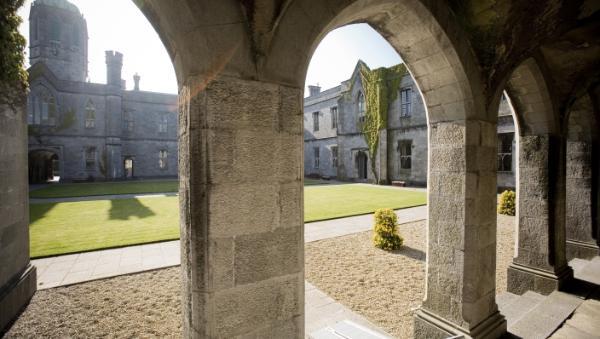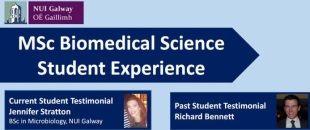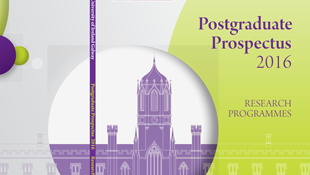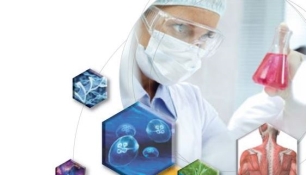-
Courses

Courses
Choosing a course is one of the most important decisions you'll ever make! View our courses and see what our students and lecturers have to say about the courses you are interested in at the links below.
-
University Life

University Life
Each year more than 4,000 choose University of Galway as their University of choice. Find out what life at University of Galway is all about here.
-
About University of Galway

About University of Galway
Since 1845, University of Galway has been sharing the highest quality teaching and research with Ireland and the world. Find out what makes our University so special – from our distinguished history to the latest news and campus developments.
-
Colleges & Schools

Colleges & Schools
University of Galway has earned international recognition as a research-led university with a commitment to top quality teaching across a range of key areas of expertise.
-
Research & Innovation

Research & Innovation
University of Galway’s vibrant research community take on some of the most pressing challenges of our times.
-
Business & Industry

Guiding Breakthrough Research at University of Galway
We explore and facilitate commercial opportunities for the research community at University of Galway, as well as facilitating industry partnership.
-
Alumni & Friends

Alumni & Friends
There are 128,000 University of Galway alumni worldwide. Stay connected to your alumni community! Join our social networks and update your details online.
-
Community Engagement

Community Engagement
At University of Galway, we believe that the best learning takes place when you apply what you learn in a real world context. That's why many of our courses include work placements or community projects.
Programme Overview
Programme Overview
Programme Overview
Terry Smith (Programme Director) and Mary Ní Fhlathartaigh (Programme Coordinator).
Welcome
We would like to welcome you to the Masters in Biomedical Science. This programme introduces students to science and engineering disciplines they would not have necessarily covered in their undergraduate studies.
The objective of this programme is to introduce students to an interdisciplinary approach to research, which utilises technologies and skills from a wide spectrum of scientific, engineering and clinical disciplines to address fundamental questions originating in biology and medicine.
Why Choose this Programme?
Located in the heart of Ireland’s biomedical device industry cluster, NUI Galway offers excellent career opportunities for biomedical science graduates. A wide variety of career opportunities exists for graduates of this programme. These include research and development in medical devices or pharmaceuticals in an industrial or academic setting, medical device sales, work in hospital laboratories and further postgraduate studies.
Furthermore, this programme is a springboard to PhD research opportunities. Our recent graduates have found employment with Boston Scientific, Regeneron, Abbott, Allergan, and Pfizer.
Below you will find programme structure and module content, entry criteria and a downloadable prospectus. If you have any queries please feel free to contact us.
Programme Structure & Module Content
The programme will be offered as a full-time, one year course consisting of 3 academic semesters. It is a blend of taught and research elements, with 20 ECTS taught and 70 ECTS research credits
- Semester 1 runs from the beginning of September through the end of the first week of December. Modules totalling 20 ECTS, including 3 taught modules and one research module will be completed in Semester 1
- Semester 2 starts on the second week of January and ends at the end of April. One 5 ECTS taught module (Scientific Writing) will be completed, while students undertaking the programme will focus most of their time and efforts on their research project
- Semester 3 begins on the first week of May and ends at the end of August. A Research Symposium, where the students present their research project and outcomes and where their performance in presenting their research project is assessed, will take place in the last two weeks of the semester. After completing Semester 3, the students will submit their MSc. thesis by the 30th of September
Semester 1 Modules - CORE
|
Materials Science & Biomaterials |
Addresses the fundamental properties and applications of biomaterials (synthetic and natural) that are used in contact with biological systems. |
|
Tissue Engineering |
Integrates the principles and methods of engineering and life sciences towards the fundamental understanding of structure-function relationships in normal and pathological mammalian tissues. |
|
Cell & Molecular Biology: Advanced Technologies (Core for non-biologists, Optional for biologists) |
Outlines the fundamentals of cell and molecular biology. |
|
Radiation & Medical Physics (Core for biologists, Optional for non-biologists) |
reviews the basic nuclear physics alluding to radiation applications in industry and its biological interactions |
|
Introduction to Business |
Focuses on the fundamental concepts of marketing, management and accountancy and their application in Irish and international business situations. Teams of students develop a business plan for a start-up biomedical science enterprise. |
|
Applied Biomedical Science |
This practical module will teach methodologies fundamental to biomedical science research and applications. Skill will be further developed during the research project. |
Semester 1 Modules – OPTIONAL (choose one):
|
Fundamental Concepts in Pharmacology |
This module introduces students to the fundamental concepts of pharmacodynamics and pharmacokinetics of drug interactions in the body. |
|
Human Body Structure |
This module develops knowledge of human anatomy in the context of biomedical science.
|
Semester 2 Modules – CORE
|
Regulatory Compliance in Healthcare Manufacturing |
Focuses on the validatory requirements within the biopharmaceutical and chemical industries. |
|
Scientific Writing |
This module aims to provide students with an in-depth understanding of the process of scientific publication (writing, reviewing articles and responding to journal editors). |
|
Molecular Medicine |
This module outlines the molecular mechanisms underlying diseases including cancer, diabetes, immune-deficient and neurodegenerative disorders. |
|
Applied Biomedical Science |
This laboratory practical module runs over the course of semester 1 and 2. Experts will teach methodologies central to biomedical science. Skills will be further developed during the research project. |
Semester 2 – OPTIONAL (choose one):
|
Advanced Tissue Engineering: |
This module is an extension of the Tissue Engineering module offered in semester 1.
|
|
Protein Technology |
Topics include industrial scale-up of protein production, proteomics and glycobiology. |
Semester 3
| MSc Biomedical Science Research Project: A 4-month research project with an academic research team on a subject related to biomedical science. |
Entry Criteria
The programme will be offered as a full-time, one year course consisting of 3 academic semesters. It is a blend of taught and research elements, with 20 ECTS taught and 70 ECTS research credits
Graduates who have a first class or second class honours level 8 BSc degree in a relevant biological or biomedical sciences, physical sciences or engineering field
- Graduates with a Level 7 degree and who can demonstrate that they have at least 2-3 years relevant experience in research or the Medical Technology, Healthcare or Biotechnology industry
- International students, whose first language is not English, will be required to prove their English competency through their school leaving examination or matriculation examination or by achieving the minimum standard in a recognised English language test, as outlined in the NUI Galway entry requirement documentation: http://www.nuigalway.ie/admissions/documents/english_language_requirements.pdf
- English language proficiency of IELTS 6.5 (with no band less than 6.0 in each element of the test) or equivalent
Duration
1 years
Avg Intake
20
Start Date
Sep 2016


















